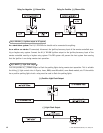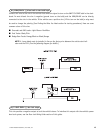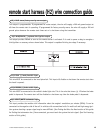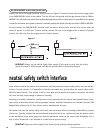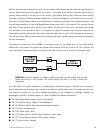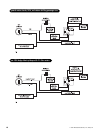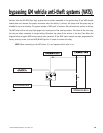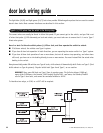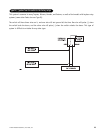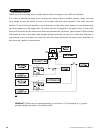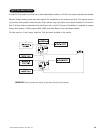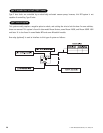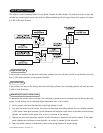
20 © 2001 Directed Electronics, Inc. Vista, CA
1995 and newer vehicle anti-theft systems
(immobilizers)
1995 and newer vehicle anti-theft systems (immobilizers) require a bypass module. The bypass module allows for
easy interfacing, while still maintaining the OEM system’s integrity.
The Passlock I and Passlock II systems can be found in the following General Motors vehicles:
■ ‘95 and newer Cavalier and Sunfire
■ ‘96 and newer Achieva, Grand Am, and Skylark
■ ‘97 and newer Intrigue, Malibu, and Cutlass
■ ‘98 and newer trucks, vans, SUVs
■ ‘99 and newer Alero
■ 2000 and newer Impala and Saturn
Passlock I and II systems are VATS-evolved. Passlock systems still rely on the R-code to start, but the pellet is no
longer placed in the key. The resistor can now be found in the key switch. This allows for a greater number of
possible R-codes. In addition, Passlock systems require “seeing” the correct R-code at the correct time. To bypass
Passlock I and II, p/n 555L or p/n 555T is required.
The Passkey III system can be found in the following vehicles:
■ ‘97 and newer Park Avenue
■ ‘98 and newer Cadillac
■ ‘99 and newer U vans, Transport, Montana, and Silhouette
■ 2000 and newer Grand Prix, LeSabre, Monte Carlo, Lumina, Bonneville
■ 2001 and newer Aurora, Aztek and Rendezvous
Other transponder-based systems include: Acura, BMW, Dodge/Chrysler/Jeep, Ford, Honda, Infinity, Mazda,
Mercedes, Mitsubishi, Nissan, Toyota, Volkswagon, and Volvo.
PK-3 and the transponder-based systems use a transponder system that locks out the ignition and fuel system.
This transponder system is comprised of two parts. The first part, the transceiver, circles the key switch and is
activated when the key is placed in the key switch or turned to the run position. Upon activation, the transceiver
passkey III (PK-3), transponder-based systems
passlock I and passlock II (PL-1 and PL-2)



